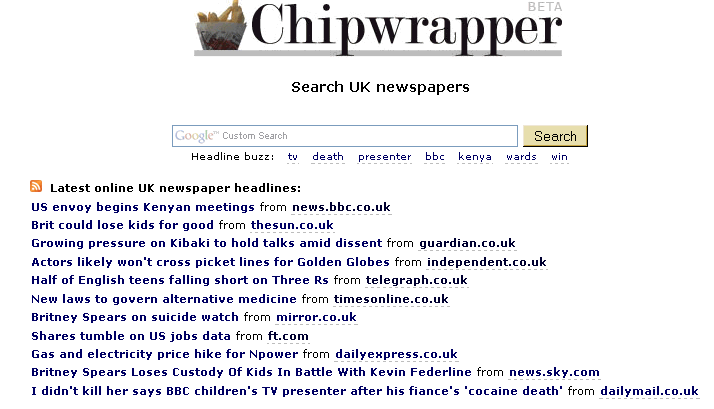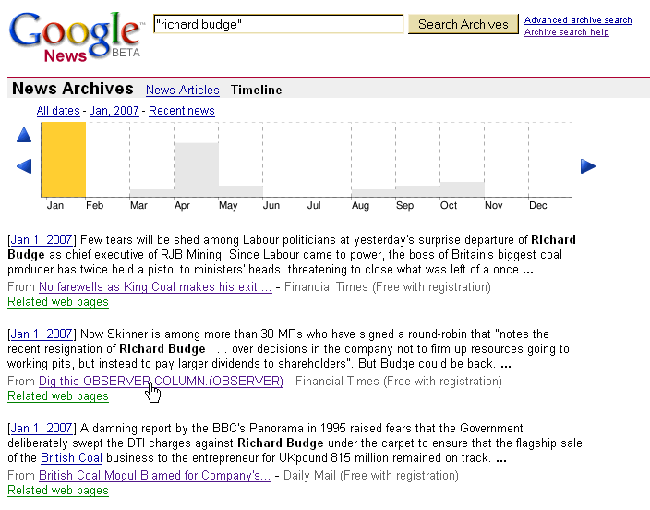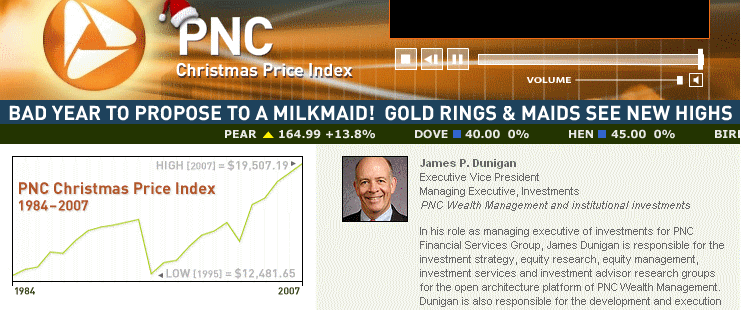
Chipwrapper is a Custom Google Search Engine that searches across the UK’s major national newspapers: The Daily Express, Daily Mail, Daily Mirror, Financial Times, The Guardian, The Independent, The Sun, The People, News of the World, The Scotsman, Daily Star, The Telegraph and The Times. It also searches the BBC News web site, ITN and Sky. It carries out a Google web search of these sources, not a Google News search, so although you cannot sort the results by date you do pull up older, archival material that is not included in the standard 30 days of Google News. As many of the newspapers give the date as part of the text of the stories you can often limit your search to a year and sometimes a specific month by simply including the month and year in your search. Also available are RSS feeds for the top headlines, general sport, rugby and football headlines, and a Chipwrapper browser search plugin is available for IE7 and Firefox 2.
I ran one of my standard test searches on Richard Budge the UK coal magnate, and included 2007 in the search strategy to limit the stories to the current year. It worked impressively well but the FT was conspicuous by its absence, and I knew that there had been at least two articles about him in the FT this year. I went direct to the FT site, ran a similar search and found three articles. I then did a Google Web search using my Chipwrapper strategy but added site:ft.com. Again three results. Back to Chipwrapper with some different searches, and it did pick up FT articles. Obviously there is something about my Richard Budge search that it does not like.
Comparison with Google News Archive
Of course Google News is probably the service that most people will use as the benchmark and this is where it becomes really interesting. Back to dear old Richard and a search in the Google News Archive. I went into the Advanced Search screen, entered the phrase Richard Budge, typed in 2007 for the year and selected Show Timeline. Unlike the Advanced Search in current Google News you cannot specify a country of origin for the source so I had to resign myself to the possibility of wading through a substantial number of articles. Google Archive News does, though, give you an option to home in on a specific month via the Timeline (see below).
Google Archive News Results with Timeline

It came up with 94 results, about twenty of which claimed to be from the Financial Times and dated Jan 1 2007. I clicked on a few of the links and they took me to the “Access My Library” site where I was repeatedly told that the articles had been deleted. I gave up after eight or nine, but I think we can assume that the FT has decided not to play ball. Three links with $$ signs next to them took me to Press Display but I was told that the items had been “removed from the back issues access”. A minority of the links took me direct to the news source, for example The Telegraph, BBC, Doncaster Today. The articles from the Guardian, Independent and Times that had been picked up by Chipwrapper were nowhere to be seen. I can only think that like the FT they have declined Google’s offer to be part of the Archive.
Conclusion
I have to confess that this is the first time I have analysed the results from Google News Archive in any depth. I was not surprised to find the FT absent but amazed that so many of the other UK daily papers were not there. Even worse, Google still has in its index links to stories that were carried by third party services, such as Access My Library and Press Display, but which have now been removed. The Timeline is still a good way of looking at major stories relating to a company or person but be aware that some of the key resources are not included.
Despite the glitch with the FT in my test search, and that there is no date sort option, Chipwrapper is a great tool for searching new and archival stories appearing in the leading UK papers. I recommend that you give it a go next time you need to research a UK story.
Note on the name Chipwrapper for non UK readers
A favourite take-away food in the UK is deep fried, battered fish with chips (mushy peas are optional but an essential component as far as I am concerned). Today, EU and Health and Safety regulations dictate that these have to be placed in grease proof paper (in practice not grease proof at all) and then wrapped in large plain sheets of off white paper. I recall that in my dim and distant youth newspaper was regarded as the superior wrapping material. Some connoisseurs claimed that the ink, which dissolved in the presence of the salt and vinegar, gave extra flavour.
